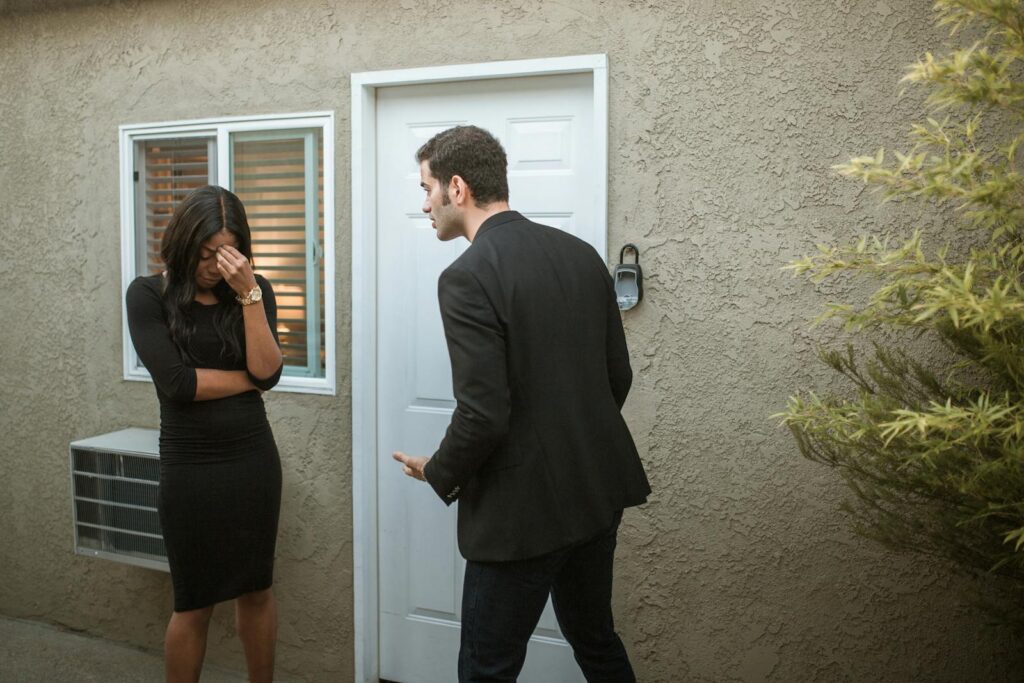
It often begins with affection that feels comforting—someone wanting to be part of everything you do. But slowly, that warmth turns stifling. You start feeling observed instead of loved. Every decision seems to require reassurance, every outing an explanation. Possessiveness doesn’t always look harsh at first. It hides behind care and little requests that add up until you realize your freedom’s been quietly replaced by their approval.
They Want Constant Updates

It begins with quick check-ins. A ping while you ride the bus. Another time when you reach. Then more. You start replying before you think. The sound of the tone makes your shoulders rise. Miss one message and your evening gets tense. You catch yourself keeping the phone face down at dinner. Conversation turns into status reports. At some point, you stop enjoying quiet pockets of time. You notice it when silence feels risky.
They Get Jealous Over Innocent Things

You mention a friend’s name, and their expression changes. A coworker laughs at your joke, and they question why. You start choosing words carefully to avoid another misunderstanding. Their jealousy isn’t about protection—it’s about power. It leaves you shrinking your world bit by bit to keep them calm. One day, you realize you’ve stopped sharing stories altogether to avoid another tense evening.
They Make You Feel Guilty for Wanting Space

You ask for a night alone, and their mood dips instantly. They treat your need for rest like rejection. You end up apologizing for something that shouldn’t need forgiveness. Space is normal—it’s how people stay balanced. But possessive partners treat it like a threat. Eventually, you stop asking, thinking it’ll help. It doesn’t. You lose a piece of yourself each time you give in.
They Check Your Phone

It happens one evening when your phone lights up. They reach for it before you do. You let it slide, but it keeps happening. Soon, you start keeping it close, not because there’s anything to hide, but because it feels uncomfortable. You turn the screen over when you leave the room. You shouldn’t have to protect something that used to feel normal.
They Criticize Your Friends

They insist your friends don’t understand you or “bring drama.” Slowly, you spend less time with them. At first, it’s to avoid arguments. Later, it’s a habit. You scroll through old group photos and feel a sting you can’t name. Possessive people isolate without asking directly—they make you believe distance is your idea. By the time you notice, your circle’s already smaller.
They Need Constant Reassurance

You tell them they matter, and for a short while, it lands. Then another question comes. Did you mean it? Are you sure? You repeat yourself until the words sound thin. A simple delay turns into doubt. You stop feeling heard and start feeling tested. Real closeness shouldn’t need reminders every few hours, yet you keep giving them, hoping this time they’ll stick.
They Overreact to Small Things

A message left unread can start an argument. You rush to explain, even when nothing happened. Their mood changes fast, and you feel it before a word is said. The air gets heavy until you adjust your tone, slow your movements, and try to stay safe. It’s not about the mistake anymore. It’s about keeping things calm long enough to breathe without waiting for the next spark.
They Control What You Wear

They comment on your outfit, and you change it to avoid tension. Next time, it’s another comment. After a few more, you stop reaching for certain clothes. You tell yourself it’s easier this way. Then one day, you notice you’ve been dressing for peace, not for comfort. The closet hasn’t changed, but somehow it doesn’t feel like yours anymore.
They Keep Tabs on Your Schedule

You tell them you’re heading out, and the questions start. Where? With who? When will you be back? You answer because you don’t want another long talk. After a while, you stop saying much at all. It’s easier that way. Plans become quiet ideas you keep to yourself. You start to notice how often you choose routine over surprise, to avoid another round of explaining.
They Apologize Without Changing

They always sound sincere when they say sorry. For a few days, things feel calm again. Then it happens all over—the same words, same promises, same pattern. You hold on to hope that this time will be different, but it never is. Apologies lose their meaning when behavior stays the same. You stop feeling relief when you hear them—you wait for the next repeat.
They Twist Your Words

You try to explain how you feel, but somehow you end up apologizing instead. They recall things differently, insist your tone was wrong, or accuse you of overreacting. It isn’t very clear. You start to doubt your memory and judgment. That’s how manipulation takes hold—quietly. When conversations leave you questioning your own reality, it’s not a case of miscommunication. It’s control disguised as reasoning.
They Track Your Whereabouts

You shared your location once, and then it became something you were expected to do every time. They notice small changes and ask about them. You start explaining before they even ask, to keep things calm. It wears you down in quiet ways. What began as care now feels like surveillance, and you realize you’re being watched more than you’re being loved.
They Turn Every Argument Into Drama

You raise a concern or offer your opinion, and suddenly it turns into a heated argument. Suddenly, they start shouting and storm out until you’re the one apologizing to calm things down. After a while, you stop speaking up altogether. Silence becomes easier than conversation. Obssessive partners use drama to discourage dissent. The peace that follows isn’t real—it’s just the aftermath of your surrender.
They Blame You for Their Emotions

If they’re upset, it’s your fault. You didn’t text enough, didn’t sound cheerful enough, and didn’t notice their mood fast enough. You spend more time managing their feelings than living your life. Their emotions become your responsibility. That’s not partnership—it’s pressure dressed as love. Over time, you forget what your own feelings even look like outside their shadow.
They Use Love to Justify Control

They say they act this way because they care. It sounds convincing until you realize “care” means compliance. Affection becomes conditional—you behave, they’re kind; you resist, they withdraw. Obsessive love confuses devotion with dominance. You start performing to keep things calm. One day, you stop recognizing yourself, and that’s when it hits you: love was never supposed to feel like a cage.

